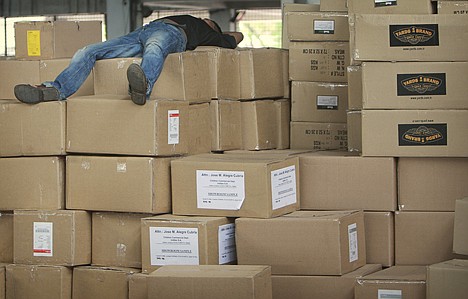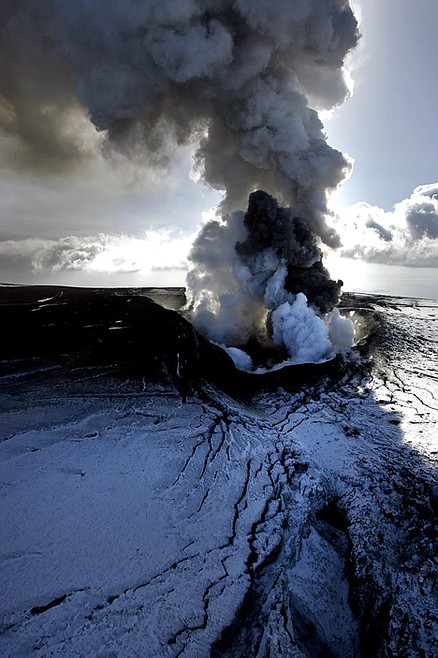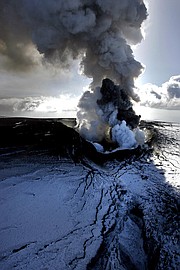Volcano tab tops $2 billion
AMSTERDAM - Airlines toted up losses topping $2 billion and struggled to get hundreds of thousands of travelers back home Wednesday after a week of crippled air travel, as questions and recriminations erupted over Europe's chaotic response to the volcanic ash cloud.
Civil aviation authorities defended their decisions to ground fleets and close the skies - and later to reopen them - against heated charges by airline chiefs that the decisions were based on flawed data or unsubstantiated fears.
The aviation crisis sparked by a volcanic eruption in Iceland left millions in flightless limbo, created debilitating losses for airlines and other industries and even threatened Europe's economic recovery. An aviation group called the financial fallout worse than the three-day worldwide shutdown after the 2001 terrorist attacks in the United States.
It was a lesson in mankind's dependency on air travel, the vulnerability of a vital industry, and the confusion that can ensue when each nation decides for itself how to handle a problem that crosses borders.
The air space over most of Europe opened Wednesday after the vast, invisible ash-laden cloud dispersed to levels deemed safe. Restrictions remained over parts of Britain, Ireland, France and the Scandinavian countries.
Electronic boards in Europe's biggest hubs - London's Heathrow, Paris' Charles de Gaulle and Germany's airport at Frankfurt - showed about 80 percent of flights on schedule as airlines began filling vacant seats with those who had been stranded for days. But with 102,000 flights scrapped worldwide over the last week, it could take over a week to get everyone home.
In Iceland, the volcano under the Eyjafjallajokull remained active Wednesday - throwing magma chunks the size of cars into the air, bubbling lava and producing tremors. But it was not shooting ash and smoke four to six miles into the air like it did previously.
"There is much, much less ash production and the plume is low," said Gudrun Nina Petersen, meteorologist at the Icelandic Met Office, adding that mild winds kept the ash away from crowded air flight corridors.
But scientists at Zurich's Federal Institute of Technology said an initial analysis of samples collected over Zurich last weekend by special weather balloons concluded that safety concerns were warranted and the volcano could be getting more dangerous.
The concentration of particles was "very high" at up to 600 micrograms per cubic meter, according to Professor Thomas Peter.
The composition of the volcanic magma also appeared to be changing into a form that could become more explosive. Peter Ulmer, a professor of petrology, said the magma has been gaining in silicate content.
If it continues, or if the nearby Katla volcano also erupts, "this could lead to the most feared of all eruptions: A Plinian eruption," Ulmer said.
That kind of eruption is named for Pliny the younger, who witnessed the devastation of Vesuvius in 79 A.D. that destroyed Pompeii. Such an event could last for weeks or months, he said.
Civil aviation officials said their decision to reopen terminals where thousands of weary travelers had camped out was based on science, not on the undeniable pressure put on them by the airlines.
"The only priority that we consider is safety. We were trying to assess the safe operating levels for aircraft engines with ash," said Eamonn Brennan, chief executive of Irish Aviation Authority.
"It's important to realize that we've never experienced in Europe something like this before," he told the AP. "We needed the four days of test flights, the empirical data, to put this together and to understand the levels of ash that engines can absorb."
Despite their protests, the timing of some reopenings seemed dictated by airlines' commercial pressures.
British Airways raised the stakes in its showdown with aviation authorities Tuesday by announcing it had more than 20 long-haul planes in the air and wanted to land them in London. Despite being told the air space was firmly shut, radar tracking sites showed several BA planes circling in holding patterns over England late Tuesday before the somewhat surprising announcement that air space was to be reopened.
"We were circling for about two hours," said Carol Betton-Dunn, 37, a civil servant who was on the first flight to land at Heathrow, from Vancouver.
She said passengers were initially told the flight would be going to London, then that it was heading for an unspecified European airport, then that Shannon airport in western Ireland would be their destination.
"It's been exhausting," Betton-Dunn said.
BA chief executive Willie Walsh said by Tuesday it had become clear the lockdown was excessive.
"I don't believe it was necessary to impose a blanket ban on all U.K. airspace last Thursday," he said. "My personal belief is that we could have safely continued operating for a period of time."
KLM Royal Dutch Airlines also sent aircraft toward Amsterdam before Dutch air space officially reopened, said Edwin van Zwol, president of the Dutch Pilots Association.
Lufthansa demanded and received a waiver from German authorities that allowed them to bring 15,000 passengers back to Germany on Tuesday, flying at low altitude. Other Germany-based airlines also received waivers, for a total of 800 flights, even though German airspace was not officially opened until Wednesday.



